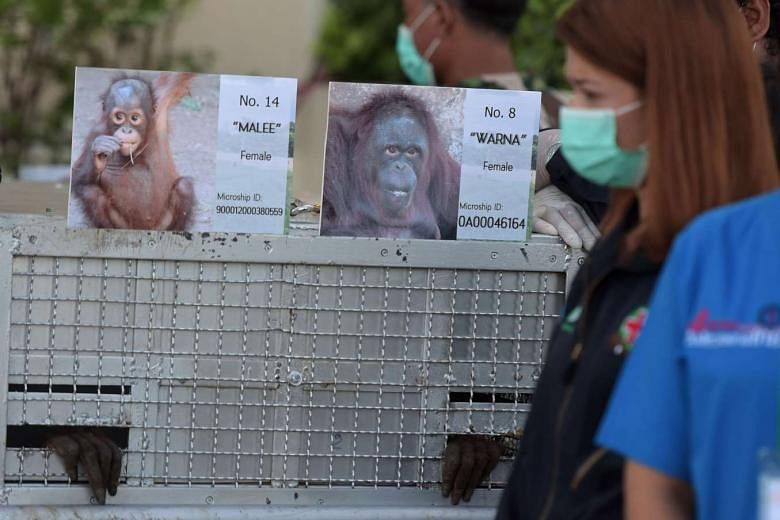Fourteen orang utans rescued from Thailand were flown home to Indonesia yesterday, some six years after most of them were seized by the wildlife authorities in the kingdom.
The long wait - caused by a technicality in Thai laws - has raised concern among animal activists given the difficulty of rehabilitating wildlife that have spent long periods in captivity. The Thai authorities are trying to change this with legal amendments aimed at concurrently tightening enforcement against the multi-million-dollar trade in endangered animals. According to the United Nations Office on Drugs and Crime, Thailand is a consumer and major trans-shipment hub for illegal wildlife.
Large seizures are not uncommon: In February, the Thai authorities confiscated 150 live pangolins being smuggled from Myanmar to China to be used in traditional Chinese medicine. Equally common is the use of wildlife to draw visitors at tourist hot spots across the country. A Phuket resort was criticised in March for making a baby elephant give rides to drunken patrons at a party.
Most of the primates sent home yesterday were rescued in 2009 from Phuket. Mr Edwin Wiek, the founder of Wildlife Friends Foundation Thailand, said the orang utans were originally found in a private zoo, but officials said they were abandoned along a highway. None of the culprits were found.
As Thai law requires the animals to be kept as evidence until legal cases are concluded, or for five years if no one claims ownership, they were put under the care of the Department of National Parks, Wildlife and Plant Conservation (DNP). Two babies were born in captivity.
"If we are talking about (confiscated) ivory, I can understand the five-year rule," said Mr Wiek. "But something that is alive should not be kept for so long."
The DNP, partly as a result of the five-year rule, is struggling to care for 20,000 confiscated animals on a 10 million baht (S$395,000) annual budget, said Ms Tuenchai Noochdumrong, director of wildlife conservation. "It's a very small budget," she lamented to The Straits Times yesterday.
The DNP is working on tougher clauses in a new wildlife protection Act, which will raise the maximum penalty for offenders to seven years' jail and a 200,000 baht fine, she said. Current laws cap the penalty at four years' jail and a fine of 40,000 baht, which activists said is not a deterrent given the massive profits that can be made from smuggling wildlife.
At Bangkok's Don Mueang airport yesterday, the primates - with a mix of Indonesian and Thai names such as "Bontang", "Jambi" and "Sawaddee" - were loaded onto an Indonesian air force plane in specially made cages. They were accompanied by veterinarians equipped with both medical equipment as well as snacks such as bananas, mangoes and biscuits.
The primates will be transported to Taman Safari park in Bogor after their arrival in Jakarta. They will stay there in quarantine for one or two months, before being transferred to rehabilitation centres in Kalimantan or Sumatra.
In a landmark decision last month, Asean security ministers added trafficking in wildlife and timber to the grouping's list of key transnational crime threats.
Indonesia's ambassador to Thailand Lutfi Rauf yesterday called for more information to be shared between countries of source and destination of smuggled animals. "We are dealing with criminals, (just like) drug traffickers," he told The Straits Times.

